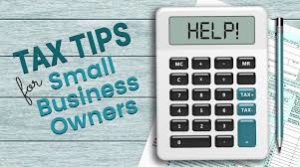 Small business owners never get a break – at least, it often feels that way. This is especially true when it comes to taxes as it often feels like the tax man gets small business owners coming and going. Examples of this include sales taxes, property taxes and then omnipresent income taxes. However, saving money on your small business taxes is not an impossible dream and below are some tips to make sure you end up with more money in the bank even after tax season.
Small business owners never get a break – at least, it often feels that way. This is especially true when it comes to taxes as it often feels like the tax man gets small business owners coming and going. Examples of this include sales taxes, property taxes and then omnipresent income taxes. However, saving money on your small business taxes is not an impossible dream and below are some tips to make sure you end up with more money in the bank even after tax season.
Don’t Go it Alone
One of the biggest mistakes that small business owners make when it comes to tax planning and paying taxes is that they try to do it themselves. Sure, you might save some money as you don’t need to pay for an accountant or tax filing software, but it also means that you probably end up paying too much tax and this is a not a good thing.
When it comes to your taxes, you don’t want to go it alone. Instead, you want to consider a service such as LYFE Accounting. A service such as this specializes in meeting the needs of small businesses and as such will understand how changes in the tax code will impact owners directly.
Taking this step not only alleviates the burden of filling out tax forms, it will also help you to take advantage of the knowledge of an experienced small business accountant. The result is that you can focus on running your business while ending up paying less in taxes without worrying about getting audited.
Keep Good Records
This can be a challenge for many small businesses – after all, you are wearing many hats and the last thing you want to do is go through a stack of bills. However, having a system to manage your records will help you in the long run as it will make it easier for your bookkeeper and accountant to do their job and will save you if your records are ever called into question.
Beyond this, keeping track of everything will help you to benefit from all the deductions available to your business – some of which you might not even be aware of. Just remember that this starts by keeping tabs on every invoice and payment.
Start Setting Money Aside for Retirement
Another mistake many business owners make is that they fail to set money aside for their retirement. The thinking often goes that the business is their retirement plan and while this is true to a certain extent it often means that small business owners often end up paying taxes in income which could be diverted into retirement savings accounts.
If you don’t want this to happen to you, then work with your accountant to figure out the maximum that you can take out of the business for retirement planning. Doing so will not only help to lower your tax burden but it will also get your money working for you through the miracle of compound interest.
Home is, Where the Office is
Let’s face it, even if you have an office or a storefront, odds are that you have turned your back bedroom into a home office of sorts. As such, you might be eligible to deduct the expenses related to your office from your taxes. This can even include a portion of the mortgage and insurance payments on your home.
Beyond this, you might even want to consider getting a dedicated internet connection for your home office as this expense is also deductible. These days home is not only where the heart is, it is also where the office is.
Don’t Forget Your Car
Just like your home, your car has probably become a remote office of sorts. This is especially true for construction companies among others. As such, you will want to keep tabs on how often you are using your car for business purposes.
In fact, there are two ways to do this. One is a standard deduction based on mileage, while another is for the actual expenses related to business-related travel. Ultimately, deciding which deduction is the best fit will depend on how often you use your car for work and how well you keep records.
Accelerated Depreciation
Also known as Section 179, accelerated depreciation is a tax incentive which allows business owners to deduct capital expenses from their taxes in the year the expenses were incurred. Think about it you could use the cost of that new piece of equipment (up to $500,000) to help lower your taxes.
Why does the government do this? The answer is simple, they want business owners to invest in the businesses as this generally helps the company to grow which means more tax revenue in the long run.
So, if you are planning an equipment purchase, then talk to your accountant about how you can take advantage of the accelerated depreciation to lower your tax bill.




No Comments